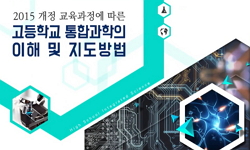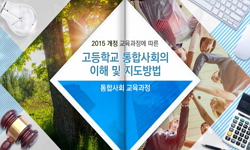The aim of this study is focused to seek the possible solutions that can get rid of the problems which had been already internalized in the literary textbook of the previous curriculum and would come out in the textbook development process of the next...
http://chineseinput.net/에서 pinyin(병음)방식으로 중국어를 변환할 수 있습니다.
변환된 중국어를 복사하여 사용하시면 됩니다.
- 中文 을 입력하시려면 zhongwen을 입력하시고 space를누르시면됩니다.
- 北京 을 입력하시려면 beijing을 입력하시고 space를 누르시면 됩니다.
https://www.riss.kr/link?id=A101862258
- 저자
- 발행기관
- 학술지명
- 권호사항
-
발행연도
2016
-
작성언어
-
- 주제어
-
KDC
700
-
등재정보
KCI등재
-
자료형태
학술저널
-
수록면
59-93(35쪽)
- DOI식별코드
- 제공처
-
0
상세조회 -
0
다운로드
부가정보
다국어 초록 (Multilingual Abstract)
The aim of this study is focused to seek the possible solutions that can get rid of the problems which had been already internalized in the literary textbook of the previous curriculum and would come out in the textbook development process of the next curriculum. For this purpose I first analyzed the coexistent relation between the multicultural perspective which was included in the 2009 revised curriculum(called ``2011 revision period``)as an achievement standard by the government education policy, and the ethnocentrism as the internal perspective which logically conflicted with the multiculturalism. Also I identified that the ethnocentrism which had become the implicit organizing principle of the literature textbooks had to be evaluated critically, preceding the political-societal demands intruded at the stage of developing textbooks. From this argument I was able to expect three major conclusions as follows;1) integration and elimination of the achievement standards of curriculum caused by workload reductions policy makes more difficult to bring out and concrete the content elements for textbook development, 2) over-sophisticating fixation of the learning process in the textbook structure and formation would cause the standardization of teaching approach, and 3) canonism prioritizing the de-contextural and implicit reading attention in selection and arrangement of the literary works would be likely to remain as it was predicted large power outages. These aspects in the government authorized textbooks system were assessed as not having a positive effect or giving a good contribution to exalt the fundamental values like the diversity of literary education. So I proposed in this study an alternative solution that includes overall rearranging achievement standards between the ``Korean language arts`` and ``Literature`` subjects, providing reinforced authorization criteria for textbook diversification, and registering and applying recommended literary works into the curriculum.
동일학술지(권/호) 다른 논문
-
2015 개정 국어과 교육과정에 따른 교과서 개발 방향 -작문 영역을 중심으로-
- 청람어문교육학회
- 박종임 ( Jong Im Park )
- 2016
- KCI등재
-
- 청람어문교육학회
- 이창근 ( Chang Keun Lee )
- 2016
- KCI등재
-
- 청람어문교육학회
- 송정윤 ( Jung Yoon Song )
- 2016
- KCI등재
-
- 청람어문교육학회
- 정병철 ( Byong Cheol Jeong )
- 2016
- KCI등재
분석정보
연관 공개강의(KOCW)
-

2015 개정 교육과정에 따른 고등학교 통합과학의 이해 및 지도방법
한국교육학술정보원 한국교육학술정보원 -

2015 개정 교육과정에 따른 고등학교 통합사회의 이해 및 지도방법
한국교육학술정보원 한국교육학술정보원 -

2018년 소프트웨어(SW) 교육 초등 핵심교원 연수-학생 참여 중심 소프트웨어(SW) 수업 설계를 위한 2015 개정 교육과정 이해(1부)-
한국교육학술정보원 전용주 교사(사직초등학교). -

2018년 소프트웨어(SW) 교육 초등 핵심교원 연수-학생 참여 중심 소프트웨어(SW) 수업 설계를 위한 2015 개정 교육과정 이해(2부)-
한국교육학술정보원 전용주 교사(사직초등학교). -

국어과 교재연구 및 교수법
한국교원대학교 최숙기





 KCI
KCI KISS
KISS

